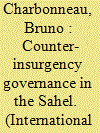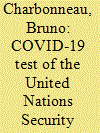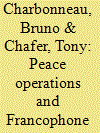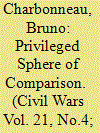|
|
|
Sort Order |
|
|
|
Items / Page
|
|
|
|
|
|
|
| Srl | Item |
| 1 |
ID:
185568


|
|
|
|
|
| Summary/Abstract |
Since 2013, the multiplication of regional and international strategies and actions directed at stabilizing Mali and the Sahel, and at countering and preventing violent extremism, has not improved the situation there and, arguably, some of it has made it worse. This article analyses the type of political order and regional governance that has been and is being built after almost a decade of international interventions in the West African Sahel. It is an effort at theorizing and making sense of what is considered here to be a permanent state of intervention in the Sahel that has evolved into a form of counterinsurgency governance—a concept being proposed to point to the influence and the infusion of counterinsurgency principles into philosophies of governance. This article argues that counterinsurgency governance insists on a set of power relations and configurations that seeks to impose limits, parameters and boundaries to the purpose of and the form that Sahelian states, governments and governance ought to take. As such, counterinsurgency governance is simultaneously a mode of governance and a web of political practices and contestation whose mechanisms have failed at fully implementing its principles in the Sahel. Its fallback is the emergence of a regional strategy to manage and establish limits to Sahelian political possibilities.
|
|
|
|
|
|
|
|
|
|
|
|
|
|
|
|
| 2 |
ID:
178319


|
|
|
|
|
| Summary/Abstract |
The United Nations Security Council (UNSC) has failed the COVID-19 test, unable to promote or facilitate multilateral cooperation in dealing with the outbreak. This is worrying given its relevance as a principal organ of the United Nations (UN) that could enable or constrain international cooperation and given the need for such cooperation in responding to the COVID-19 pandemic. The failure of the UNSC to respond adequately to the COVID-19 pandemic highlights the historical limits of the UNSC as a forum for international cooperation. It also suggests that highlighting and debating UNSC reforms are not sufficient or even productive ways to move forward, especially in the context of the challenges that pandemics and climate change represent for global cooperation. It is far from clear if the UN system can change the global structures on which it was built. What does seem clear is that the UNSC is not where one will find the seeds of change for reimagining global order.
|
|
|
|
|
|
|
|
|
|
|
|
|
|
|
|
| 3 |
ID:
085593


|
|
|
|
|
| Publication |
2008.
|
| Summary/Abstract |
This article argues that the contemporary IR literature on global order and American hegemony has limitations. First, the critical discourse on hegemony fails to adequately examine the deeply embedded nature of regularized practices that are often a key component of the acceptance of certain state and social behaviours as natural. Second, much of the (neo)Gramscian literature has given primacy to the economic aspects of hegemonic order at the expense of examining global military/security relations. Lastly, much of the literature on global order and hegemony has failed to fully immerse itself within a detailed research program.
|
|
|
|
|
|
|
|
|
|
|
|
|
|
|
|
| 4 |
ID:
135295


|
|
|
|
|
| Summary/Abstract |
Comparisons of peacebuilding with historic practices of imperialism are common, but these comparisons have sustained a hegemonic antagonism between humanitarian and imperialist interpretations of international peace intervention. This article argues that this common framing externalises the problem of intervention, romanticises local resistance, and forecloses to investigation the articulation between militarised peace practices and transnational capitalist relations. To do so, the article analyses the case of Francophone Africa, thus providing a context that has been left unexplored in peacebuilding debates. By bringing back in the historicity of particular Franco-African imperial experiences into peacebuilding research, the article reveals the militarisation of politics, transnational elite networks, and the dominant intellectual predispositions that work to reproduce the legitimacy of hegemonic practices of ‘peace’ interventionism. In the last section, the article analyses the debates over the UN-French 2011 intervention in Côte d'Ivoire to reveal the connections between the ethics of humanitarian interventions and the political economy of imperialism. The article concludes that the imperial legacy of peacebuilding is found in old capabilities, new organising logics, and specific practices and power relations and that to focus on the humanitarian-imperialist antagonism caricatures the relationships between ‘local’ and ‘international’ actors.
|
|
|
|
|
|
|
|
|
|
|
|
|
|
|
|
| 5 |
ID:
169236


|
|
|
| 6 |
ID:
071966


|
|
|
|
|
| Publication |
2006.
|
| Summary/Abstract |
The global context of the 1990s imposed constraints on French security policy in sub-Saharan Africa, but it has also offered new opportunities to reauthorize and relegitimize French military cooperation, military intervention, and prepositioned forces after the fiasco of the Rwandan genocide. It is argued that the post-Rwanda French military doctrine of the mastery of violence has relegitimized French hegemony by identifying violence as the enemy to be contained, controlled, and eliminated. The "new" military cooperation (symbolized by the program of RECAMP [Renforcement des capacités africaines au maintien de la paix]) has in fact redefined the French "right" of military intervention in Africa instead of promoting the formal objectives of security and development.
|
|
|
|
|
|
|
|
|
|
|
|
|
|
|
|
| 7 |
ID:
114750


|
|
|
|
|
| Publication |
2012.
|
| Summary/Abstract |
This introductory article presents the history of francophone spaces to critically assess their specificity, and to situate them in academic debates on peace operations. It argues that the specificity is the inescapable a priori context of peace missions, even if this context is rapidly evolving and in interaction with non-francophone spaces. The specificity is nevertheless increasingly difficult to identify, as new practices and conditions emerge and as the lines between different francophone spaces and between francophone and non-francophone spaces are increasingly fluid. The article explores the range of possibilities that emerge from such interrogations, and emphasizes that to add the experiences of 'francophone spaces' to analyses of peace operations is to confront the dynamics of inclusion and exclusion already expressed by the terms 'francophone' and francophonie. This approach points to where and how hegemonic practices move and change between locations and different contexts, and where and how the organization or reorganization of power is negotiated, imposed and/or resisted across 'francophone' and 'non-francophone' spaces.
|
|
|
|
|
|
|
|
|
|
|
|
|
|
|
|
| 8 |
ID:
169938


|
|
|
|
|
| Summary/Abstract |
This Special Issue emphasises how power and power relations involved in establishing limits and boundaries to define, categorise and understand the world through comparison are intimately tied to conflict and intervention practices and dynamics. Indeed, when pundits, practitioners, academics and even conflict actors compare settings of armed conflict and intervention, they are participating in an inherently political move. The most off-handed of comments connect to assemblages that enable the production of categories and concepts from which it becomes difficult to think differently. Our comparisons perform worlds of armed conflict, and international interventions more often than not reflect those performances.
|
|
|
|
|
|
|
|
|
|
|
|
|
|
|
|
| 9 |
ID:
169942


|
|
|
|
|
| Summary/Abstract |
Comparison is a method that cannot avoid that its concepts are approximations made for specific audiences or purposes. Deployed to compare armed conflicts, it naturalises the state as the central unit of analysis and the intervention as the external context. This article proposes a strategy that reveals the colonial legacies that form or perform the units of analysis. The possibility of comparing Côte d’Ivoire and Mali appears only when one considers a prior comparison: between Francophone Africa and other ‘worlds’. The construction of a French privileged sphere of intervention is inextricably tied to establishing a privileged sphere of comparison.
|
|
|
|
|
|
|
|
|
|
|
|
|
|
|
|
| 10 |
ID:
115325


|
|
|
|
|
| Publication |
2012.
|
| Summary/Abstract |
Violence in the context of international peace interventions is rarely problematized. It is associated with the conflict belligerents, while the violence deployed by peacekeepers is not conceived as such, but as 'peace operations' that mitigate, subdue or deter the belligerents' violence. This common interpretation comes from a discrimination between 'local' and 'international' that is considered theoretically necessary to understand interventions. The distinction obscures the ways in which the two kinds of violence are intimately intertwined and tied to competing claims about legitimate agency. This article analyses the peace interventions (2002-11) that led to regime change in Côte d'Ivoire. Based on this case-study analysis, it argues that violence and its representations affect and constitute agency. In Côte d'Ivoire, strict ontological commitments to the 'local' and 'international' quality of agents neglect the violence used in the context of intense negotiations over, and attempts at imposing, a line between 'local' and 'international' agency. The analysis points to how violence established, transformed, and enabled agency under conditions of international peace interventionism in Côte d'Ivoire.
|
|
|
|
|
|
|
|
|
|
|
|
|
|
|
|
| 11 |
ID:
092131


|
|
|
|
|
| Publication |
2009.
|
| Summary/Abstract |
This article analyses the ways in which rapidly emerging narratives of EU-UN cooperation in military crisis management are rewriting and re-authorizing European practices of military intervention in Africa. By problematizing the underlying assumptions, this article points to the increasing significance of uncertainties about the location of contemporary political life, the location of 'crisis management', and thus to the diverse effects of a crisis management approach to African conflicts. Hence, this article problematizes and challenges a range of powerful normative claims about 'EU crisis management'. The emerging narratives are practices of knowledge and space that shape EU-Africa relations and that create new spaces of intervention, thus establishing and enabling relations of authority and control. Last, the article discusses briefly how such practices worked in the case of EUFOR Tchad/RCA (European Forces in Chad and the Central African Republic).
|
|
|
|
|
|
|
|
|
|
|
|
|
|
|
|
|
|
|
|
|